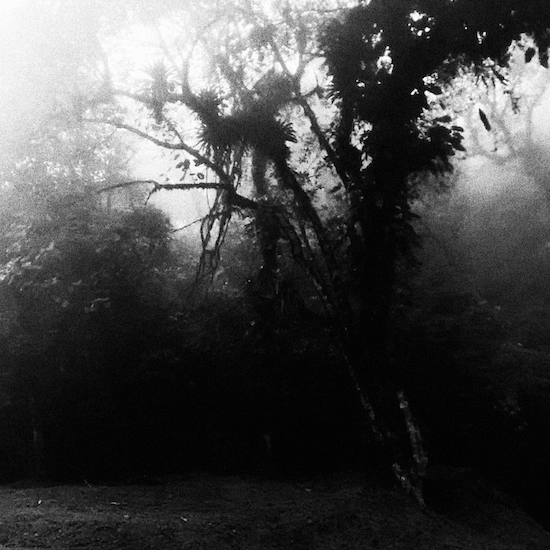
(written by Islander)
The Brazilian musician A. Enrique (aka Henry or H.) has fired his varied musical creations into the world through a number of cannons — among them, Astral Lore, Woe Bearer, Gateways, and Cavern, and if you click those links you’ll see that we’ve written about most of them. And now he adds one more to the battery.
The newest project is named Chains, in which H. is the lyricist and performs all instruments, joined by vocalist Thomas Prunet (also a participant in Astral Lore and Woe Bearer). As for why H. created a new project when he already had so many others, it’s because the music differs from that of his other endeavors. As he explains, “It’s a mix Sludge/Post-Black Metal, heavily influenced mainly by Andavald and Amenra, but turned out to sound quite different…”
Chains has recorded a debut album entitled Subjugate the Unknown to the Yoke of Reason that will be released by Primitive Archive on April 4th, but we’re giving you the chance to hear it today. Of course we have some thoughts to share with you about what you’ll hear, but to begin we have some insights about the album’s themes from H.:

A little bit of a background that might be useful is that I started the project and recorded it right at the beginning of that dreadful time that was the pandemic back in 2020, so the lyrical themes are mostly about hopelessness (nothing worse than absolutely the whole planet being lost and not knowing what to do or where to look for for help). Although the last track (and title and album title) are taken from the book “We” by Yevgeny Zamyatin, and it is about the spreading of the human race throughout the universe, and with it the destruction that we tend to cause, the inevitability of the consequences of our existence.
The album includes only three songs, but each one is lengthy, especially the title song, which reaches nearly 17 minutes. As foretold above, the lyrics are extremely dark — hopeless, desperate, even apocalyptic. Much the same could be said about phases of the music, but there are other phases too.
For example, the opener “Rigid Mold” quickly submerges the listener in swaths of titanic yet eerie sound. The music booms with immense power in the low end and brings layers of swirling sonic filaments in the stratosphere that create a surreal atmosphere, simultaneously brilliant and frightening. The vocals, however, are entirely frightening, the kind of intense screams that seem to manifest the shattering of sanity into shards.
Accompanied by glittering cymbals, the drums reverberate (everything else seems to vibrate too), and they vary the rhythmic cadence. As they do, the music also transforms. Still surreal, still hallucinatory, those immersive swaths of multi-layered sound create sensations of confusion and despair, a chilling of the splendor.
The same ingredients meld together in “Led Astray” as well — flows of astral mystery and wonder above, gargantuan throbs and undulations deep below, tendrils of shimmering and quivering brilliance veined through it all, reverberating beats to keep things on course, and screams of pure torture to lacerate ears and minds. That song’s central musical motif cycles over and over again, and its overarching mood is one of terrible grief and hopelessness.
That same slowly rising and falling motif, slightly varied, flows through into the very long title song, and carries the same mood with it initially. As the song unfurls, those quivering and piercing melodic filaments become more feverish, more tormented in their mood. Even the enormous throbs of the bass begin to sound disturbed — but once again, nothing is more disturbing than Thomas Prunet‘s ruinous shrieks, the breathtaking sounds of someone seemingly tearing themself apart from inside out.
Near the middle of the song, a phase of alternating sequences begins. The screams vanish and the decibels come down, yielding to a soft and shimmering harmony of misery, a harmony that becomes more intensely stricken when the power of the music rises again. The power ebbs and flows, and with each ebb a new motif of misery emerges.
Eventually, at high tide, the music storms. The drums blast, the bass throbs like an earthquake deep in the mantle, the surround-sound becomes a ravishing whirlpool. It’s the only point in the album when the music feels really fast. When the drums settle, the music again creates vistas of astral splendor, but there’s also something soulful and yearning in the piercing whir and rippling wail of the guitar that surfaces near the end, channeling a kind of bright and wondrous (but possibly still desperate) psychedelia.
Listening to that long guitar solo is spellbinding. If you’re like me, it will stay in your head long after the album ends.
So yes, all the songs are long, but they’re not at all monotonous. To the contrary, in all their massive and mysterious ways they’re captivating. All are built around repeating musical refrains and rhythmic patterns, but the patterns change, and in doing so they change the atmosphere. And while the moods reflected in the songs are recognizably human, and indeed quite dark in different ways (made even darker by the terrifying vocals), the music persistently sounds un-real, indeed like a far-reaching journey into a perilous unknown.
https://primitivearchive.bandcamp.com/album/subjugate-the-unknown-to-the-yoke-of-reason
